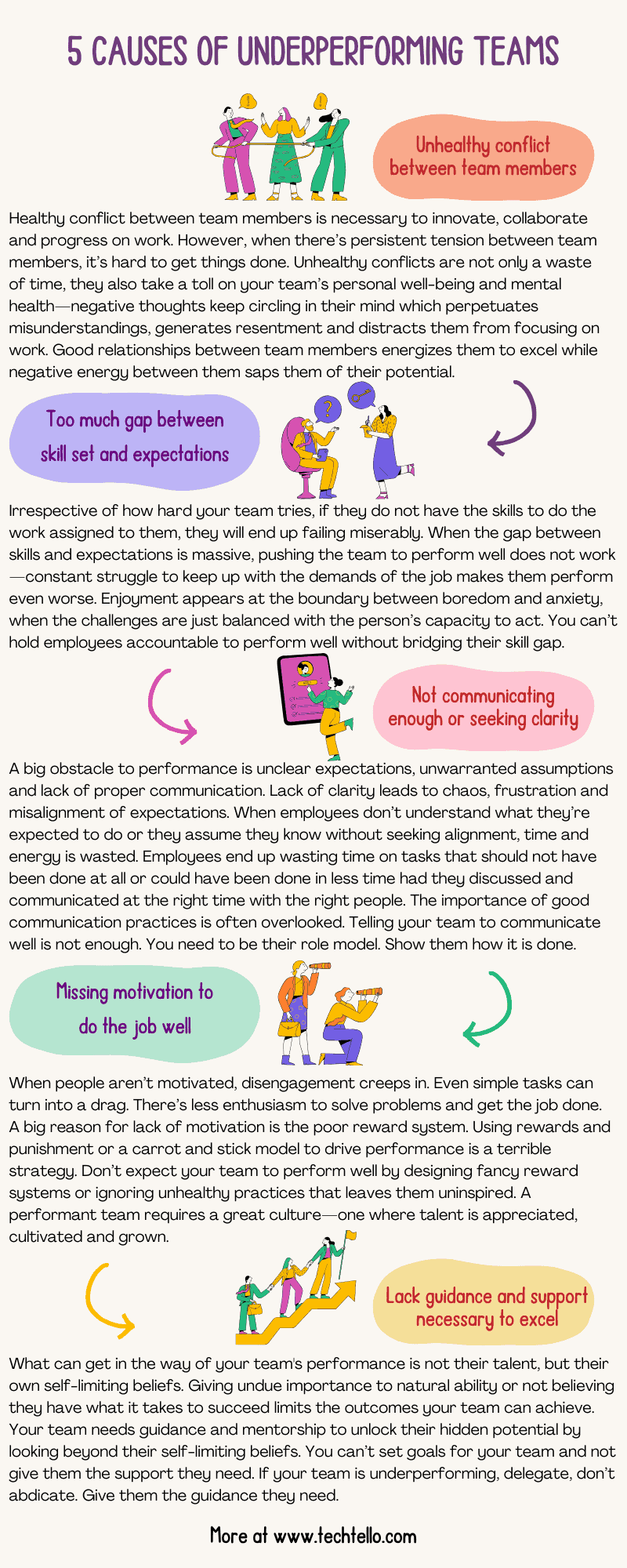5 Causes of Underperforming Teams

What do leaders and managers do when their teams underperform? They try to blame others, find flaws with hiring practices or pin it on external circumstances and conditions that were impossible to plan.
We couldn’t deliver because of unclear requirements.
We have some very bad hires.
We can’t predict that the third party company will shut down.
These excuses may give them temporary relief from facing the disappointment of an underperforming team, but ignoring the real reason for underperformance is very harmful in the long run.
Dealing with a team that isn’t meeting expectations can be quite overwhelming if you don’t understand what’s causing subpar performance in the first place. Without knowing the root cause, any strategies you apply to tackle poor performance will be ineffective—they will only make you feel defeated, discouraged and let down.
A fractured team is just like a broken arm or leg; fixing it is always painful, and sometimes you have to rebreak it to make it heal correctly. And the rebreak hurts a lot more than the initial break, because you have to do it on purpose.
— Patrick Lencioni, The Five Dysfunctions of a Team
Blaming, shaming or scolding people won’t fix the problem though. It won’t turn your team around. Rather, being offensive or rude in such situations will demotivate your team and make them perform even worse.
If you want to build a high performance team, diagnose the real problem that’s hurting their productivity and performance. In most cases, it’s one of these five core reasons:
Unhealthy conflict between team members
Instead of working towards shared goals, do your team members work against each other? Do they blame, complain and try to put others down? Do they disagree only to appear smart by proving others wrong?
Healthy conflict between team members is necessary to innovate, collaborate and progress on work. However, when there’s persistent tension between team members, it’s hard to get things done.
Unhealthy conflicts are not only a waste of time, they also take a toll on your team’s personal well-being and mental health—negative thoughts keep circling in their mind which perpetuates misunderstandings, generates resentment and distracts them from focusing on work.
Team members underperform because more time is spent in debates, rumination and resolving conflicts and less time in doing productive work.
Teammates don’t have to be best friends. In fact, the diversity and differences among the individual team members will probably preclude close friendships. However, the relationships must be solid enough to withstand the turbulence of day-to-day interaction, misunderstandings, and an occasional bad day. Solid team relationships provide the climate needed for high levels of cooperation and are characterized by trust, acceptance, respect, understanding, and courtesy.
— Pat MacMillan, The Performance Factor
If your team is underperforming, pay close attention to the relationship between team members:
- How do they speak to each other? Watch both tone and language.
- Do they help each other or refuse to be supportive?
- How do they handle disagreements? Do they agree to disagree or disagree and commit?
Good relationships between team members energizes them to excel while negative energy between them saps them of their potential.
Too much gap between skill set and expectations
Is your team expected to do work that matches their skill set or the complexity far exceeds their current abilities?
Irrespective of how hard your team tries, if they do not have the skills to do the work assigned to them, they will end up failing miserably. When the gap between skills and expectations is massive, pushing the team to perform well does not work—constant struggle to keep up with the demands of the job makes them perform even worse.
Mihaly Csikszentmihalyi, author of Flow says “Enjoyment appears at the boundary between boredom and anxiety, when the challenges are just balanced with the person’s capacity to act.”
In other words, we seek just the right level of difficulty. Also called Goldilocks Rule, named after the fairy tale Goldilocks and the three bears, the rule states that human beings experience peak motivation when working on tasks that are right on the edge of their current abilities. Neither too easy nor too difficult. Just right. Manageable difficulty rids us of feeling bored with tasks that are easy for us while not getting frustrated when it far exceeds our current abilities.
If your team is underperforming, they may be lacking crucial skills:
- What are the strengths of the different members of your team? What are their weaknesses?
- Does the work assigned to different members of your team align with their strengths?
- What gaps in skills can make the tasks too demanding or too challenging?
You can’t hold employees accountable to perform well without bridging their skill gap. Give them work aligned with their strengths and opportunities to practice and build new skills.
Not communicating enough or seeking clarity
Do your team members put in effort to communicate well with others? Do they seek clarity to do the job well or do they base their decisions on unfounded assumptions, ambiguous data and their own biases?
A big obstacle to performance is unclear expectations, unwarranted assumptions and lack of proper communication. Lack of clarity leads to chaos, frustration and misalignment of expectations.
When employees don’t understand what they’re expected to do or they assume they know without seeking alignment, time and energy is wasted. Rework leads to frustration, missed deadlines and poor performance.
Employees end up wasting time on tasks that should not have been done at all or could have been done in less time had they discussed and communicated at the right time with the right people.
When there is a lack of clarity, people waste time and energy on the trivial many. When they have sufficient levels of clarity, they are capable of greater breakthroughs and innovations – greater than people even realise they ought to have – in those areas that are truly vital.
— Greg McKeown, Essentialism
If your team is underperforming, identify the communication gaps that might be causing it:
- What level of clarity do they have on requirements?
- What do they do to reduce the gap between their understanding and expectations?
- How do they validate their assumptions?
- When their work involves other teams and functions, how often do they communicate and collaborate? What challenges might other teams pose? Are they prepared to handle it?
- Do they repeat important information enough and keep it documented?
The importance of good communication practices is often overlooked. Telling your team to communicate well is not enough. You need to be their role model. Show them how it is done.
Missing motivation to do the job well
On a scale of 1-5, how motivated is your team? Do they enjoy their work? Do they feel a sense of progress, purpose and belonging?
When people aren’t motivated, disengagement creeps in. Even simple tasks can turn into a drag. There’s less enthusiasm to solve problems and get the job done.
If your team is underperforming, check their motivation levels. Any of these reasons can mess up with their head and make them underperform:
- Being paid poorly
- Culture of distrust
- Don’t feel heard
- Feel underappreciated, burnt out or disrespected
Another reason for lack of motivation is the poor reward system. Using rewards and punishment or a carrot and stick model to drive performance is a terrible strategy.
“People use rewards expecting to gain the benefit of increasing another person’s motivation and behavior, but in so doing, they often incur the unintentional and hidden cost of undermining that person’s intrinsic motivation toward the activity,” says Daniel Pink in Drive.
Human beings don’t need rewards to feel motivated, they need the right environment to flourish and succeed. Help them achieve excellence in their work by doing these 3 things:
- Give them autonomy: Enable them to make their own decisions.
- Help them achieve mastery: Align opportunities with aspirations to enable them to do better.
- Align on purpose: Clarify their “why.” Knowing the “why” of doing something is highly motivational.
Don’t expect your team to perform well by designing fancy reward systems or ignoring unhealthy practices that leaves them uninspired. A performant team requires a great culture—one where talent is appreciated, cultivated and grown.
Lack guidance and support necessary to excel
What kind of guidance and mentorship do you provide to your team? What practices do you follow to unlock your team’s hidden potential?
What can get in the way of your team’s performance is not their talent, but their own self-limiting beliefs. Giving undue importance to natural ability or not believing they have what it takes to succeed limits the outcomes your team can achieve.
Your team needs guidance and mentorship to unlock their hidden potential by looking beyond their self-limiting beliefs:
- Challenge them to step outside their comfort zone. It’s a great way to push beyond their self-perceived limitations and enable them to reach for their potential.
- Help them build creative thinking skills by asking questions instead of providing answers.
- Show them the value of effort, attitude and practice in building new skills instead of relying only on talent.
- Guide them to use experience and knowledge of people along the way instead of trying to do it all alone.
- Enable them to take small steps towards their goals instead of giant leaps.
You can’t set goals for your team and not give them the support they need. Leaving them to struggle and figure everything out on their own leads to frustration, confusion and helplessness.
Involved too much? You run the risk of micromanagement. Involved too little? It can make you miss those critical moments where your support or advice could have made a difference. The magic is in the balance.
Delegation without follow-through is abdication. You can never wash your hands of a task. Even after you delegate it, you are still responsible for its accomplishment, and monitoring the delegated task is the only practical way for you to ensure a result. Monitoring is not meddling, but means checking to make sure an activity is proceeding in line with expectations.
— Andy Groove, High Output Management
If your team is underperforming, delegate, don’t abdicate. Give them the guidance they need.
Summary
- If your team is underperforming, stop pointing fingers and try to identify what might be causing it.
- Performance suffers when team members don’t get along. An unhealthy relationship between them can make it hard to get things done— more time is wasted in resolving conflicts and differences of opinion and less in doing productive work.
- If the gap between your team’s skills and what they’re expected to do is massive, they will constantly struggle to achieve their goals. People do their best work when working on tasks that are right on the edge of their current abilities. Help your team perform better by giving them work aligned with their strengths and opportunities to bridge their skill gap.
- Poor communication is the root cause of most problems at work, which includes an underperforming team. Not having enough clarity to do the task well or failing to communicate well with others can lead to misalignment of expectations.
- Performance suffers when your team is demotivated. Instead of trying to motivate them through rewards or speeches, design a positive workplace culture which can help them learn, grow and succeed.
- Finally, your guidance and mentorship is crucial. Unlock your team’s hidden potential by helping them step outside their comfort zone and get past their limiting beliefs.






























